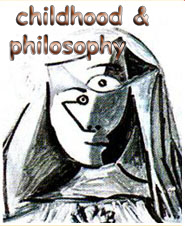desarrollar el razonamiento y la investigación de los niños, el análisis de conceptos y las habilidades de creación de significados a través de la comunidad de investigación.
DOI:
https://doi.org/10.12957/childphilo.2018.28144Palabras clave:
critical thinking, assessment, philosophical dialogue, community of inquiry, Philosophy for ChildrenResumen
This paper presents the results of a research done to investigate the effectiveness of Philosophy for Children (P4C), a pedagogy employing philosophical dialogue in a community of inquiry, in a Philippine primary school. Quantitative analysis of critical thinking skills identified by Sharp and Splitter (1995) as (1) reasoning; (2) concept analysis; and (3) meaning-making revealed that there was a considerable increase in the frequency of the children’s use of such critical thinking skills over the course of fifteen (15) sessions of dialogical inquiry. Moreover, qualitative analysis of excerpts from the dialogue transcripts accounted for the refinement of the children’s use of the critical thinking skills. This pioneering work thus calls for further research that will implement P4C in other grade levels and to explore other indicators of development in children’s thinking. Further, it recommends that primary schools adopt P4C in Philippine basic education curriculum and that teacher education institutions provide teacher training and include P4C for pre-service training.
Descargas
Descargas
Publicado
Cómo citar
Número
Sección
Licencia
el copyright de cada artículo pertenece a cada autor. childhood & philosophy tiene el derecho a la primera publicación. el permiso de reimprimir cualquier artículo que haya aparecido en la revista necesita de la autorización escrita del autor. en adisión a cualquier forma de reconocimiento requerido por el autor el siguiente aviso debe ser añadido a la declaración de permiso en la reimpresión (con los números apropiados a los puntos suspensivos): [título del artículo] fue publicado originalmente en la infancia y la filosofía, tomo ..., número ..., pp. ...-...




